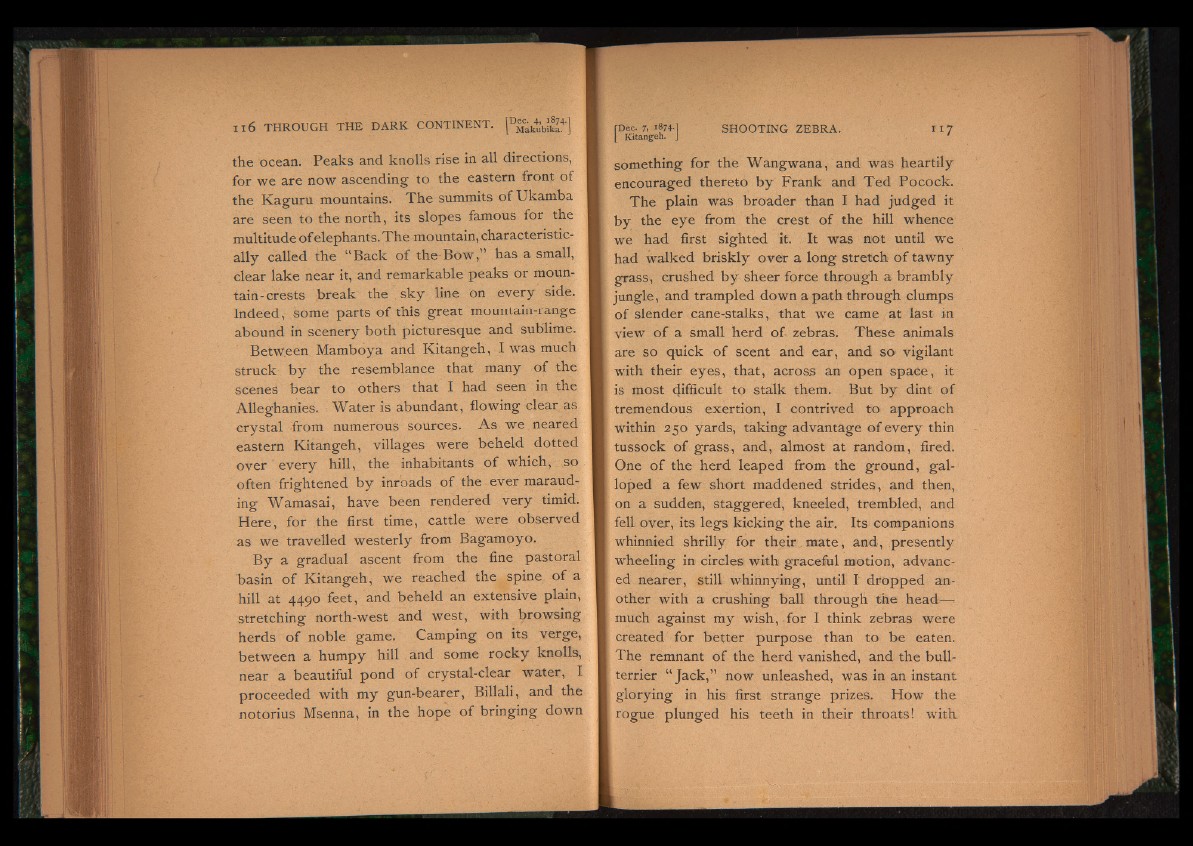
the ocean. Peaks and knolls rise in all directions,
for we are now ascending to the eastern front of
the Kaguru mountains. T h e summits o f Ukamba
are seen to the north, its slopes famous for the
multitude o f elephants. T h e mountain, characteristica
lly called the “ Back o f the B ow ,” has a small,
clear lake near it, and remarkable peaks or moun-
fain-crests break the sk y line on every side.
Indeed, some parts o f this great mountain-range
abound in scenery both picturesque and sublime.
BetW.een Mamboya and Kitangeh, I was much
struck b y the resemblance that many o f the
scenes bear to others that I had seen in the
Alleghanies. Water is abundant, flowing clear as
crystal from numerous sources. A s we neared
eastern Kitangeh, villages were beheld dotted
over every hill, the inhabitants o f which, so
often frightened b y inroads o f the ever marauding
Wamasai, have been rendered ve ry timid.
Here, for the first time, cattle were observed
as we travelled westerly from Bagamoyo.
B y a gradual ascent from the fine pastoral
basin o f Kitangeh, we reached the spine o f a
hill at 4490 feet, and beheld an extensive plain,
stretching north-west and west, with browsing
herds o f noble game. Camping on its verge,
between a humpy hill . and some ro c k y knolls,
near a beautiful pond o f crystal-clear water, I
proceeded with my gun-bearer, Billali, and the
notorius Msenna, in the hope o f bringing down
fDec. 7, 1874.I
[ Kitangeh. J
something for the Wangwana, and was heartily
encouraged thereto b y Frank and T ed Pocock.
The plain was broader than I had judged it
by the eye from the crest o f the hill whence
we had first sighted it. It was not until we
had walked briskly over a long stretch o f tawny
grass, crushed b y sheer force through a brambly
jungle, and trampled down a path through clumps
of slender cane-stalks, that we came at last in
view o f a small herd o f zebras. These animals
are so quick o f scent and ear, and so vigilant
I with their eyes, that, across an open space, it
I is most difficult to stalk them. But b y dint o f
■ . I tremendous exertion, I contrived to approach
■ within 250 yards, taking advantage o f every thin
tussock o f grass, and, almost at random, fired.
One o f the herd leaped from the ground, g a lloped
a few short maddened strides, and then,
on a sudden, staggered, kneeled, trembled, and
fell over, its legs kicking the air. Its companions
whinnied shrilly for their mate, and, presently
wheeling in circles with graceful motion, advanced
nearer, still whinnying, until 1 dropped another
with a crushing ball through the head—
much against my wish, for I think zebras were
created for better purpose than to be eaten.
The remnant o f the herd vanished, and the bull-
terrier “ Jack,” now unleashed, was in an instant
glorying in his first strange prizes. How the
rogue plunged his teeth in their throats! with.